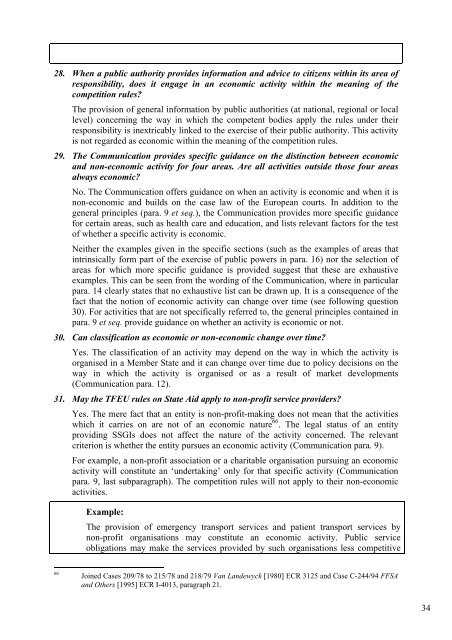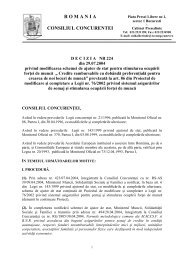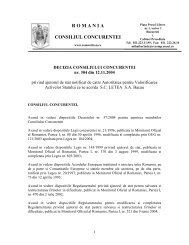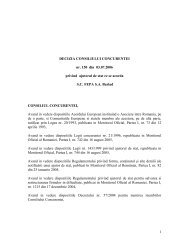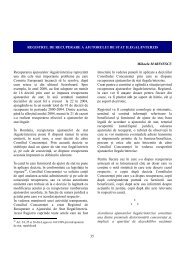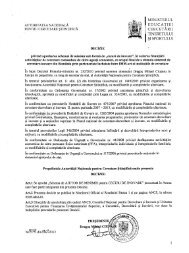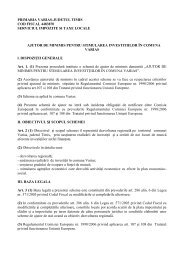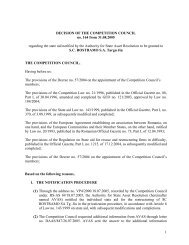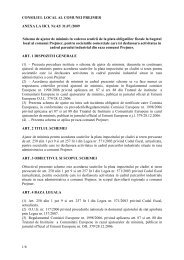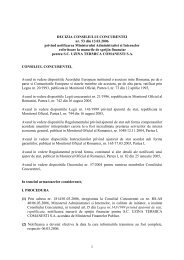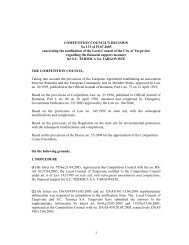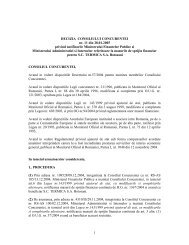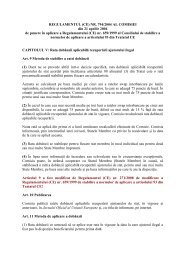Brussels, 15.2.2013 SWD(2013) 53 final COMMISSION STAFF ...
Brussels, 15.2.2013 SWD(2013) 53 final COMMISSION STAFF ...
Brussels, 15.2.2013 SWD(2013) 53 final COMMISSION STAFF ...
You also want an ePaper? Increase the reach of your titles
YUMPU automatically turns print PDFs into web optimized ePapers that Google loves.
28. When a public authority provides information and advice to citizens within its area ofresponsibility, does it engage in an economic activity within the meaning of thecompetition rules?The provision of general information by public authorities (at national, regional or locallevel) concerning the way in which the competent bodies apply the rules under theirresponsibility is inextricably linked to the exercise of their public authority. This activityis not regarded as economic within the meaning of the competition rules.29. The Communication provides specific guidance on the distinction between economicand non-economic activity for four areas. Are all activities outside those four areasalways economic?No. The Communication offers guidance on when an activity is economic and when it isnon-economic and builds on the case law of the European courts. In addition to thegeneral principles (para. 9 et seq.), the Communication provides more specific guidancefor certain areas, such as health care and education, and lists relevant factors for the testof whether a specific activity is economic.Neither the examples given in the specific sections (such as the examples of areas thatintrinsically form part of the exercise of public powers in para. 16) nor the selection ofareas for which more specific guidance is provided suggest that these are exhaustiveexamples. This can be seen from the wording of the Communication, where in particularpara. 14 clearly states that no exhaustive list can be drawn up. It is a consequence of thefact that the notion of economic activity can change over time (see following question30). For activities that are not specifically referred to, the general principles contained inpara. 9 et seq. provide guidance on whether an activity is economic or not.30. Can classification as economic or non-economic change over time?Yes. The classification of an activity may depend on the way in which the activity isorganised in a Member State and it can change over time due to policy decisions on theway in which the activity is organised or as a result of market developments(Communication para. 12).31. May the TFEU rules on State Aid apply to non-profit service providers?Yes. The mere fact that an entity is non-profit-making does not mean that the activitieswhich it carries on are not of an economic nature 66 . The legal status of an entityproviding SSGIs does not affect the nature of the activity concerned. The relevantcriterion is whether the entity pursues an economic activity (Communication para. 9).For example, a non-profit association or a charitable organisation pursuing an economicactivity will constitute an ‘undertaking’ only for that specific activity (Communicationpara. 9, last subparagraph). The competition rules will not apply to their non-economicactivities.Example:The provision of emergency transport services and patient transport services bynon-profit organisations may constitute an economic activity. Public serviceobligations may make the services provided by such organisations less competitive66Joined Cases 209/78 to 215/78 and 218/79 Van Landewyck [1980] ECR 3125 and Case C-244/94 FFSAand Others [1995] ECR I-4013, paragraph 21.34


